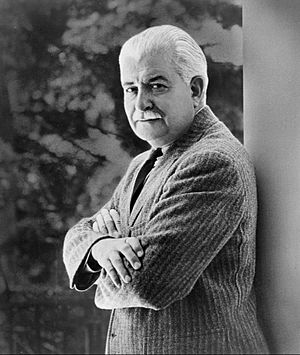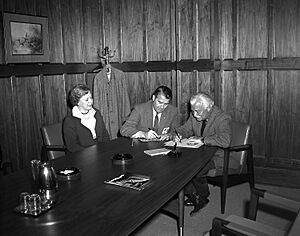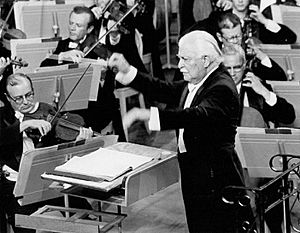Arthur Fiedler facts for kids
Quick facts for kids
Arthur Fiedler
|
|
|---|---|

Fiedler in 1968
|
|
| Background information | |
| Born | December 17, 1894 Hyde Park, Boston, Massachusetts, U.S. |
| Died | July 10, 1979 (aged 84) Brookline, Massachusetts, U.S. |
| Occupation(s) | Conductor |
| Instruments | Violin, piano, percussion, organ |
| Years active | 1915–1979 |
Arthur Fiedler (born December 17, 1894 – died July 10, 1979) was a famous American conductor. He was best known for leading the Boston Symphony and Boston Pops orchestras. Fiedler combined great musical skill with a fun, showman-like style. He helped make the Boston Pops one of the most famous orchestras in the United States. Some people thought he made classical music too popular. But Fiedler kept his concerts relaxed and entertaining to attract many people.
Contents
Arthur Fiedler's Early Life and Career
Arthur Fiedler was born in Boston, Massachusetts. His parents, Johanna and Emanuel Fiedler, were immigrants from Austria. His father played the violin in the Boston Symphony Orchestra, and his mother was a pianist. Arthur grew up in Boston and went to Boston Latin School.
In 1910, his family moved to Vienna, Austria. Then they moved to Berlin, where Arthur studied violin. He attended the Royal Academy of Music from 1911 to 1915. When World War I began, Fiedler returned to Boston. In 1915, he joined the Boston Symphony Orchestra as a violinist. He also played the piano, organ, and percussion.
Forming the Boston Sinfonietta
In 1924, Fiedler started his own group called the Boston Sinfonietta. This was a chamber music orchestra made up of Boston Symphony members. He also began a series of free outdoor concerts.
Leading the Boston Pops Orchestra
In 1930, Arthur Fiedler became the conductor of the Boston Pops Orchestra. Most conductors lead the Pops for a short time. But Fiedler made it his life's work, staying for 50 years!
Under Fiedler, the Boston Pops made more recordings than almost any other orchestra. Most of these were for RCA Victor. Their total sales were over $50 million. His first recordings were in 1935. These included "Jalousie" by Jacob Gade, which sold over a million copies. They also made the first full recording of Rhapsody in Blue by George Gershwin.
Fiedler recorded many types of music. He recorded light classical pieces, songs from Broadway shows, and Hollywood movies. He even recorded arrangements of popular music, including songs by the Beatles. He made only one recording with the Boston Symphony Orchestra: Dvorak's New World Symphony.
In 1970, Fiedler and the Boston Pops started recording for other labels. These included Deutsche Grammophon and Polydor Records. His last album was called Saturday Night Fiedler, which featured disco music.
Guest Conducting Around the World
Fiedler also conducted the San Francisco Pops Orchestra for 26 summers, starting in 1949. He led many other orchestras all over the world. He was a featured conductor on NBC's The Standard Hour shows in the early 1950s.
In 1971 and 1972, Fiedler even conducted the high school bands at John Hersey High School. He was very impressed by their recordings.
Fiedler's Hobbies and Public Appearances

Arthur Fiedler had many interesting hobbies. He loved firefighters and would drive to big fires in Boston to watch them work. He was even made an "Honorary Captain" in the Boston Fire Department! Other fire departments gave him honorary helmets and badges.
Fiedler was also a big fan of sailing. During World War II, he volunteered for the Temporary Reserve of the U.S. Coast Guard. He later became a member of the Coast Guard Auxiliary.
Fiedler appeared on television many times. He conducted at the opening of Walt Disney World in 1971. He was also a regular on Evening at Pops, a show on PBS.
Honors and Awards
In 1972, Fiedler received an Honorary Doctorate of Music from Berklee College of Music. He was also given the University of Pennsylvania Glee Club Award of Merit in 1976. This award honors people who have made a big difference in music.
On January 10, 1977, President Gerald Ford gave Fiedler the Presidential Medal of Freedom. This is one of the highest awards a civilian can receive in the U.S.
The Bicentennial Celebration
Many people remember Fiedler for his performance on July 4, 1976. He conducted the Boston Pops at the Hatch Memorial Shell for the U.S. Bicentennial celebration. He led the 1812 Overture without his jacket. The concert ended with huge fireworks over the Charles River. It was a highlight of the day's television coverage. People loved seeing Fiedler, who was older but clearly enjoying himself, puffing his cheeks to the music.
Arthur Fiedler's Family Life

In 1942, Arthur Fiedler married Ellen Bottomley. They had three children: Johanna, Deborah, and Peter.
In 1994, Fiedler's daughter, Johanna, wrote a book about him. It was called Arthur Fiedler: Papa, the Pops and Me.
Later Years and Legacy
In December 1978, Fiedler had brain surgery. He recovered and celebrated his 84th birthday. His last season with the Boston Pops was in 1979. The season began on May 1, marking his 50th year as conductor. He conducted famous pieces like An American in Paris and Rhapsody in Blue.
Arthur Fiedler passed away on July 10, 1979, at his home in Brookline, Massachusetts. A few days later, the Boston Symphony Orchestra performed a concert like the famous 1976 Bicentennial show.
In 1984, Boston honored him with a sculpture, a large bust of Fiedler. It is located near the Charles River Esplanade. This area is still home to free concerts today. John Williams, a famous composer, became the next director of the Boston Pops.
Fiedler's collection of programs, photos, and notes are kept at Boston University. The university has a reading room named after him. It holds his personal collection of music scores and books.
See Also
 In Spanish: Arthur Fiedler para niños
In Spanish: Arthur Fiedler para niños
- Arthur Fiedler Footbridge
- Arthur Fiedler Memorial
 | James B. Knighten |
 | Azellia White |
 | Willa Brown |


